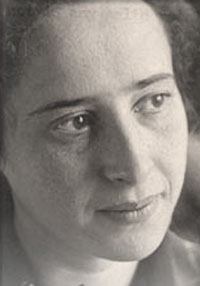
HANNAH ARENDT
There is "a strange interdependence between thoughtlessness
and evil."
--Hannah Arendt
|
| Hannah Arendt, in her often-quoted account of the trial
of Nazi Adolf Eichmann, Eichmann in Jerusalem: A Report on the Banality
of Evil, wrote: "The deeds were monstrous, but the doer was quite ordinary,
commonplace, and neither demonic or monstrous." Arendt concluded that Eichmann,
far from having the desire to prove a villain, sent thousands to their
deaths merely because of "a lack of imagination." His only motive
was personal advancement: "he never realized what he was doing."
Arendt wondered whether "the activity of thinking as such, the habit of
examining and reflecting upon whatever happens to come to pass, regardless
of the specific content and quite independent of results...could 'condition'
men against evildoing." |
| ITEM: AFTER ORDERING THE KILLING OF 501 OLD MEN, WOMEN,
AND CHILDREN IN THE VILLAGE OF MY LAI, LT. WILLIAM CALLEY HAD LUNCH JUST
YARDS FROM THE DITCH IN WHICH MANY OF HIS VICTIMS LAY.....AT HIS COURT-MARTIAL,
CALLEY WAS ASKED BY PROSECUTOR AUBREY DANIEL WHETHER HE TOOK THE TIME TO
LET HIS SUPERIORS KNOW OF THE MASSACRE THAT HE HAD JUST ORDERED.
CALLEY'S REPLY: "NO SIR....IT WASN'T ANY BIG DEAL, SIR." |
|

